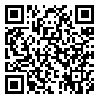1. Naderifar N, Akbari B, Sadeghi A. Structural modeling of the relationship between spiritual health with addiction tendency in adolescents: the mediating role of emotional well-being. Journal of Shahid Sadoughi University of Medical Sciences. 2023;31(9):7038–50. [Persian] [
DOI]
2. Anbari A, Akbari B, Sadeghi A, Mafi M. Structural relationships of family functioning and high-risk behaviors of adolescents with the mediating role of individual psychological factors. Community Health. 2023;10(1):1–13. [Persian] [
DOI]
3. Nawi AM, Ismail R, Ibrahim F, Hassan MR, Manaf MRA, Amit N, et al. Risk and protective factors of drug abuse among adolescents: a systematic review. BMC Public Health. 2021;21(1):2088. [
DOI]
4. Astolfi RC, Leite MA, Papa CHG, Ryngelblum M, Eisner M, Peres MFT. Association between self-control and health risk behaviors: a cross-sectional study with 9th grade adolescents in São Paulo. BMC Public Health. 2021;21(1):1706. [
DOI]
5. Liang ZQ, Dou K, Li JB, Wang YJ, Nie YG. Linking self-control to negative risk-taking behavior among chinese late adolescents: a moderated mediation model. Int J Environ Res Public Health. 2022;19(13):7646. [
DOI]
6. Tangney JP, Baumeister RF, Boone AL. High self‐control predicts good adjustment, less pathology, better grades, and interpersonal success. J Pers. 2004;72(2):271–324. [
DOI]
7. Gillebaart M. The 'operational' definition of self-control. Front Psychol. 2018;9:1231. [
DOI]
8. Golestanehi SA, Mohammadi M, Davoodi A, Fath N. The effectiveness of mindfulness on behavior inhibition, self -control and high- risk behaviors in attention deficit hyperactive disorder adolescents. Journal of Research in Behavioural Sciences. 2021;18(4):519–34. [Persian] [
DOI]
9. Saeedmanesh M, Azizi M, Hematian Z. The effectiveness of mindfulness and the attention bias program on attention, inhibition and emotional regulation in children with generalized anxiety disorder. Jornal of Cognitive Psychology. 2020;8(2):33–45. [Persian] [
Article]
10. Nezamzadeh B, Tayebi S, Malekirostamabadi M, Akbari HR, Namjoo F. Predicting the tendency to high-risk behavior based on psychological helplessness and distress tolerance in delinquent adolescents. Journal of Adolescent and Youth Psychological Studies. 2021;2(1):12–23. [
DOI]
11. Mattingley S, Youssef GJ, Manning V, Graeme L, Hall K. Distress tolerance across substance use, eating, and borderline personality disorders: a meta-analysis. J Affect Disord. 2022;300:492–504. [
DOI]
12. Brown RA, Palm Reed KM, Bloom EL, Minami H, Strong DR, Lejuez CW, et al. A randomized controlled trial of distress tolerance treatment for smoking cessation. Psychology of Addictive Behaviors. 2018;32(4):389–400. [
DOI]
13. Veilleux JC. The relationship between distress tolerance and cigarette smoking: a systematic review and synthesis. Clin Psychol Rev. 2019;71:78–89. [
DOI]
14. Navab M, Dehghani A, Salehi M. Effect of compassion‐focused group therapy on psychological symptoms in mothers of attention‐deficit hyperactivity disorder children: a pilot study. Couns Psychother Res. 2019;19(2):149–57. [
DOI]
15. Rabipour F, Hosseininasab SD, Salari A. Comparing the effectiveness of cognitive rehabilitation therapy and mindfulness-based therapy on the anxiety of patients with hypertension: a randomized clinical trial. Middle Eastern Journal of Disability Studies. 2022;12:190. [Persian] [
Article]
16. Kabat-Zinn J. Full catastrophe living: using the wisdom of your body and mind to face stress, pain, and illness. New York, NY, USA: Delta Trade Paperback/Bantam Dell; 2005.
17. Suárez-García Z, Álvarez-García D, García-Redondo P, Rodríguez C. The effect of a mindfulness-based intervention on attention, self-control, and aggressiveness in primary school pupils. Int J Environ Res Public Health. 2020;17(7):2447. [
DOI]
18. Saeid Manesh M, Parsaee M. Mindfulness-based therapy on cognitive distortions and self-control in teens receiving substance dependence treatment. Middle Eastern Journal of Disability Studies. 2020;10:65. [Persian] [
Article]
19. Keshavarz Valian N, Hassanzadeh S, Kashani Vahid L, Asaseh M. Efficacy of child-centered mindfulness training on the self-control and social competence in the children with attention deficit hyperactivity disorder. Journal of Modern Psychological Researches. 2022;17(68):225–34. [Persian] [
Article]
20. Saadipour E, Soltanizadehya H, Dortaj F. The effectiveness of mindfulness based cognitive therapy on self-control and academic performance of students with high/low level of test anxiety. J Child Ment Health. 2020;7(2):183–94. [Persian] [
DOI]
21. Liu B, Xie Q, Guan Y, Zhou AY, Zhang AJ, Liu X. The longitudinal mediating effect of distress tolerance in a mindfulness-based intervention: a randomized controlled trial. Journal of Evidence-Based Psychotherapies. 2023;23(2):49–78. [
DOI]
22. Falah A, Heydari Sh, Emadian SO. Comparing the effectiveness of mindfulness-based stress reduction and compassion-focused therapy on distress tolerance, high-risk behaviors and feelings of loneliness in students with self- injurious behaviors. Journal of Torbat Heydariyeh University of Medical Sciences. 2023;11(2):99-113. [
DOI]
23. Tajzad Ghehi A, Moradi H, Bigdeli H. The effectiveness of mindfulness therapy on rumination and distress tolerance in adolescent girls with high body mass index. Journal of Adolescent and Youth Psychological Studies. 2023;4(3):72–87. [Persian] [
DOI]
24. Nasiri Karbasdehi Z, Fakhri MK, Gnanadzadegan HA. The effectiveness of mindfulness training on distress tolerance, resilience and emotion regulation in students with symptoms of generalized anxiety disorder. Iranian Journal of Educational Society. 2023;9(1):413-23. [Persian] [
Article]
25. Joghataei A, Mafakheri A, Bakhshipoor A. Evaluation of the effectiveness of mindfulness training on high-risk and procrastination behaviors and fear of success among students. Journal of Applied Family Therapy. 2023;4(1):64–81. [Persian] [
Article]
26. Mange J, Mauny N, Montcharmont C, Legrand E, Lemercier-Dugarin M, Mortier A, et al. A prevention program for binge drinking among students based on mindfulness and implementation intention (ALCOMEDIIT): a randomized controlled trial. Trials. 2024;25(1):1. [
DOI]
27. Zadeh Mohammadi A, Ahmadabadi Z, Heidari M. Construction and assessment of psychometric features of Iranian Adolescents Risk-Taking Scale. Iranian Journal of Psychiatry and Clinical Psychology. 2011;17(3):218–25. [Persian] [
Article]
28. Simons JS, Gaher RM. The Distress Tolerance Scale: development and validation of a self-report measure. Motiv Emot. 2005;29(2):83–102. [
DOI]
29. Azadmanesh M, Abolmaali K, Mohammadi A. The consideration of validity and reliability of Persian version of Self-Control Questionnaire among students. Journal of Psychometry. 2020;8(32):107–23. [Persian]
30. Mahmoudpour A, Shariatmadar A, Borjali A, Shafiabadi A. Psychometric properties of the Distress Tolerance Scale (DTS) in the elderly. Quarterly of Educational Measurement. 2022;12(46):49–64. [Persian] [
Article]
31. Rabipour F, Hosseininasab SD, Salari A. The effectiveness of mindfulness-based therapy on working memory indices in patients with hypertension: a randomized clinical trial. Feyz. 2023;27(5):501–11. [Persian] [
Article]




